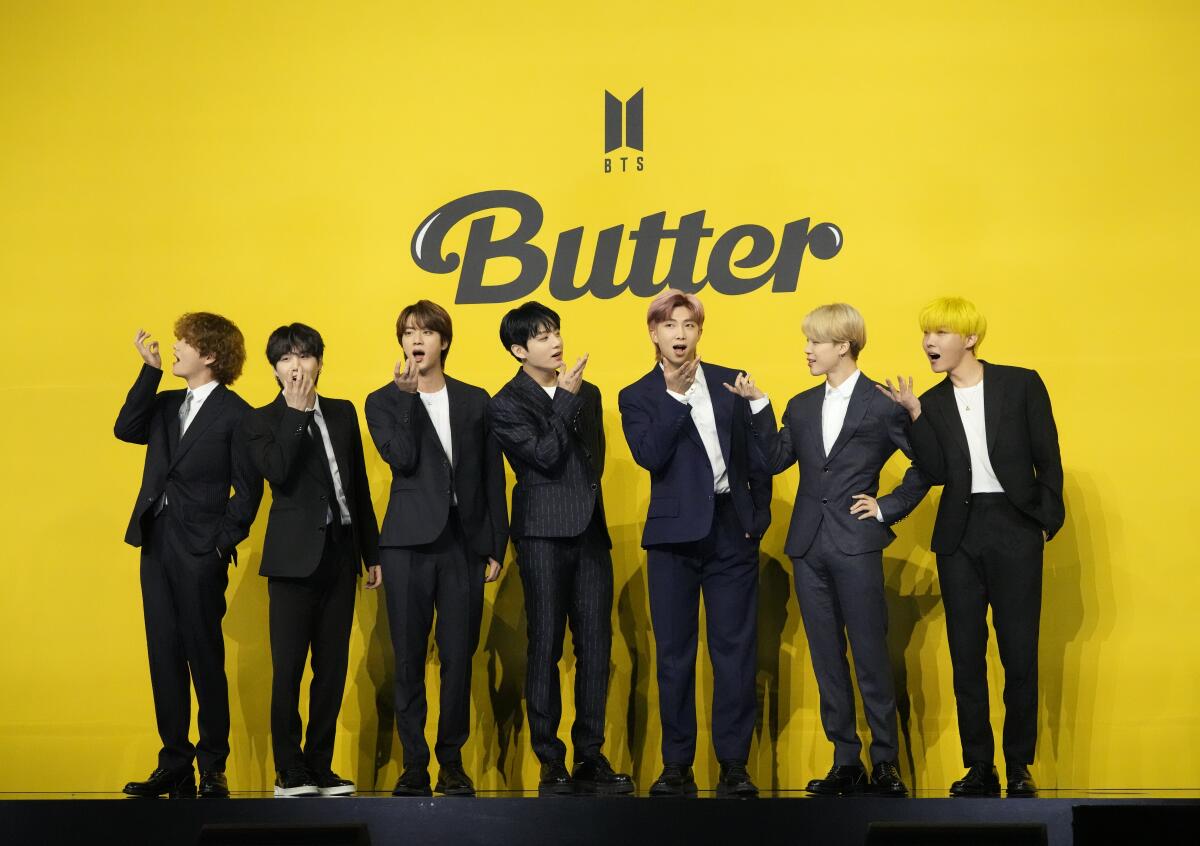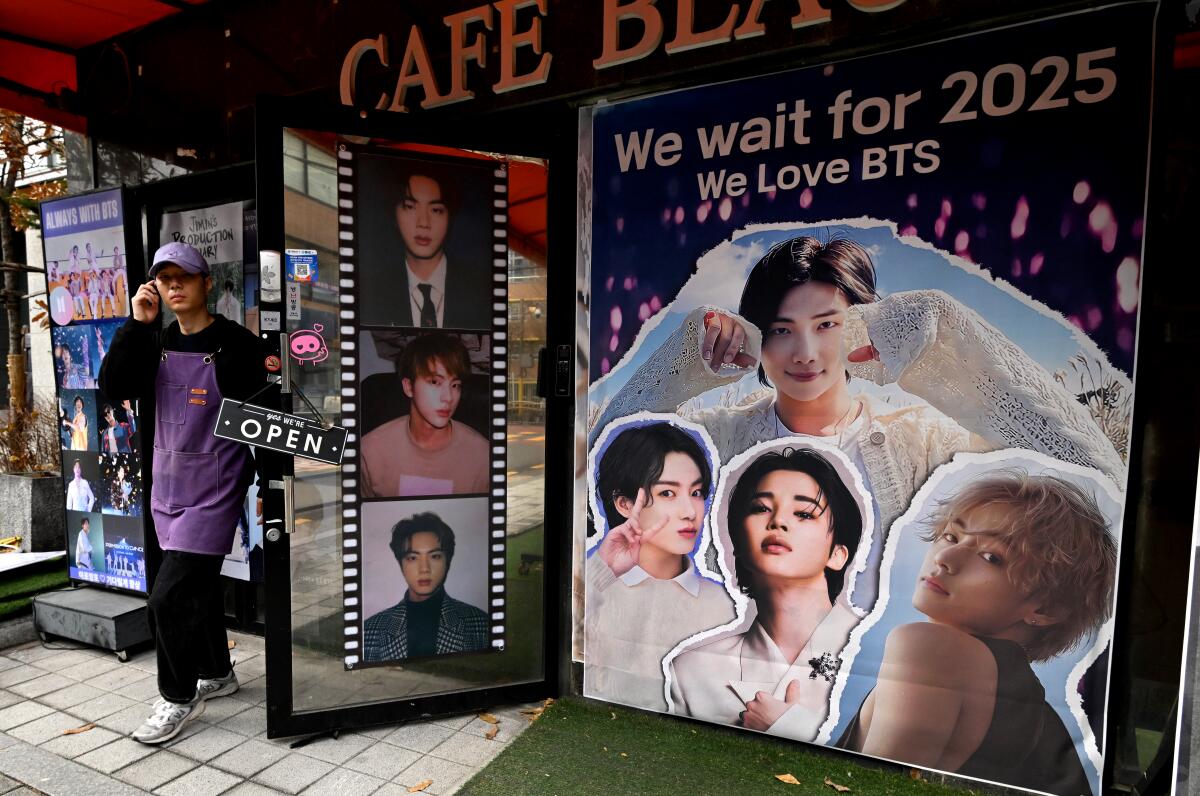For a band that is on a mandatory hiatus for South Korean military service, BTS had one of the best years of its career.
Last December, group member RM released “Indigo,” his first solo LP since 2018, which rose to No. 3 on the Billboard 200. In March, J-Hope’s single “On the Street,” with J. Cole, reached the lower half of the Billboard Hot 100. In April, Jimin’s neon-soaked synthpop single “Like Crazy” hit No. 1 on the Hot 100 — the first solo act since Psy (“Gangnam Style”) to do so with a single in Korean. The next month, Suga (under his Agust D alias) took No. 2 on the Billboard 200 with his rap album “D-Day,” and sold out a nationwide arena tour including two nights at the Kia Forum.
Then in July, Jungkook landed his first Hot 100 No. 1 single, “Seven” with Latto, a centerpiece of his English-language pop LP “Golden,” which hit No. 2. V later bowed in September with the No. 2 album “Layover,” charting behind only Olivia Rodrigo.
BTS, arguably the biggest group in the world, and its label Big Hit Music clearly crafted a master plan to tide fans over as the seven members fulfill their 18-month military bids (South Korean men must serve by the time they hit 28, although some K-pop stars can defer until 30). Historically, it’s been a turning point in careers, when male acts can lose momentum or evolve out of their bright-eyed early material.
When BTS, whose members range from age 25 to 30, wraps up service in 2025, it will almost certainly return to the same rapt crowds they last saw at four sold-out concerts at SoFi Stadium in 2021, and at two packed Rose Bowl shows in 2019. A lot is on the line for Big Hit and its parent company, Hybe, as it expands into hip-hop, Latin and global music. But 2023 shows BTS’ members have built substantial reach as solo stars in the U.S.
“Right now, BTS represents a new standard for K-pop and international acts at large,” said Jeff Benjamin, a writer specializing in K-pop for Billboard and other outlets. “Before BTS, there wasn’t this sort of consistently record-breaking career. More K-pop acts are hitting those traditional markers, but no one has been able to surpass what they’ve set forth.”

BTS introduces its single “Butter” in Seoul, South Korea, in 2021.
(Associated Press)
BTS’ time apart began when Jin enlisted in the South Korean army in December 2022. J-Hope followed suit, while Suga joined as a social service agent (likely due to an old shoulder injury) with a 21-month term. RM, V, Jimin and Jungkook enlisted this month. The members’ enlistments were marked by head-shaving photos, a first step in the transition into military service.
Yet over the last year, they’ve barely felt absent from pop culture. Last year’s greatest-hits double-LP “Proof” came with two new songs, “Yet to Come (the Most Beautiful Moment)” and “Run BTS,” priming fans for the future. In June, they released “Take Two,” a tender bro-down single where the band promised unending fealty — “I am so grateful and happy to be with you / Let’s continue to be happy in the future” they sang in Korean.
Meanwhile, BTS has released the first two episodes of its Disney+ docuseries “BTS Monuments: Beyond the Star.” An old single, “Spring Day,” just hit No. 1 on the world digital song sales chart six years after its release.

“Back in the day, the military service meant a complete isolation from the world,” said Jae Yoon Choi, CEO and co-founder of the K-pop creative agency KAI Media and retail hub Hello82. “The military services used to affect artists very much in the past, but now it doesn’t. The service got shortened, and it’s easier for artists to prepare both for joining and the come back after.”
Jenny Zha, the CEO of Infinitize, a K-pop-focused marketing agency, thinks that BTS is uniquely positioned to come out of military service with music that reflects the members’ challenges and changes while serving.
“Historically, artists who have completed military service often undergo personal growth and maturity, and the time away from the spotlight can allow for deeper introspection,” Zha said. The members of BTS are “artists who have always allowed their music to be influenced by their personal journeys and understanding of the world.”
They may even have benefited from the time apart as solo acts. (Acts from KISS to OutKast have taken breaks to pursue solo projects, only to successfully reunite later.) BTS members’ individual chart successes allowed U.S. pop fans to see new elements of their styles that deep-cut devotees have always valued. Jimin’s sophisticated synthpop, Jungkook’s neo-disco acrobatics, V’s misty R&B and Suga’s ferocious rapping all proved their mettle outside the context of the band.
But will K-pop audiences have moved on once BTS returns?
Female-led groups like Blackpink and Twice have played stadiums and major festivals like Coachella; younger groups like NewJeans and Le Sserafim won wide critical praise. BTS’ labelmates Tomorrow X Together and other male acts like Stray Kids and Ateez have become arena sellouts as well.
“Artists are getting comfortable with the U.S. market even more than before,” Choi said, “and the market is accepting the fact that BTS is not the only artist from South Korea’s music scene.”
Hybe, meanwhile, has been building its portfolio within and beyond K-pop. BTS’ members all re-signed with Hybe for their return, and after hiring mega-manager Scooter Braun to run its U.S. division, the company bought up the hip-hop label Quality Control (Migos, Lil Baby) and the Latin label Exile Music.
“Is that the future, more acts releasing concurrent Spanish- and Chinese-language albums too?” Benjamin asked. “Hybe is getting smarter and more strategic about targeting different markets.”

A poster of BTS in front of a cafe in Seoul.
(Jung Yeon-je / AFP via Getty Images)
Live music in 2023 was defined by stadium mega tours by Taylor Swift, Beyoncé and Morgan Wallen, and lengthy Vegas residencies by Adele, Usher and U2 (the latter at the new Sphere). Whenever BTS comes back, they’ll be one of the hottest commodities in touring. But some experts wonder whether they’ll be eager to get right back on the road.
“I think something like an ‘Eras’ tour for them would be brilliant, because they do have very distinct conceptual moments,” Benjamin said. “But they might come back and say ‘Touring is tough,’ it might not be what they’re looking for. They didn’t do a full world tour post-pandemic. I do wonder if that’s indicative of their mind-set about touring.”
If nothing else, the time away has sharpened the resolve of BTS’ famed Army of fans to organize in their stead — and plan for the world-shaking event of their return, whenever it comes. Think Elvis returning from military service, times seven.
“Fans have always been at the core of BTS’ success due to their incredible organization and gathering as a community,” Zha said. “Fans are already starting to unite more closely to organize events, streaming parties or other community-building initiatives to keep BTS’ presence alive. This laser-like focus is also why BTS’ eventual reunion will be a sight to watch.”

